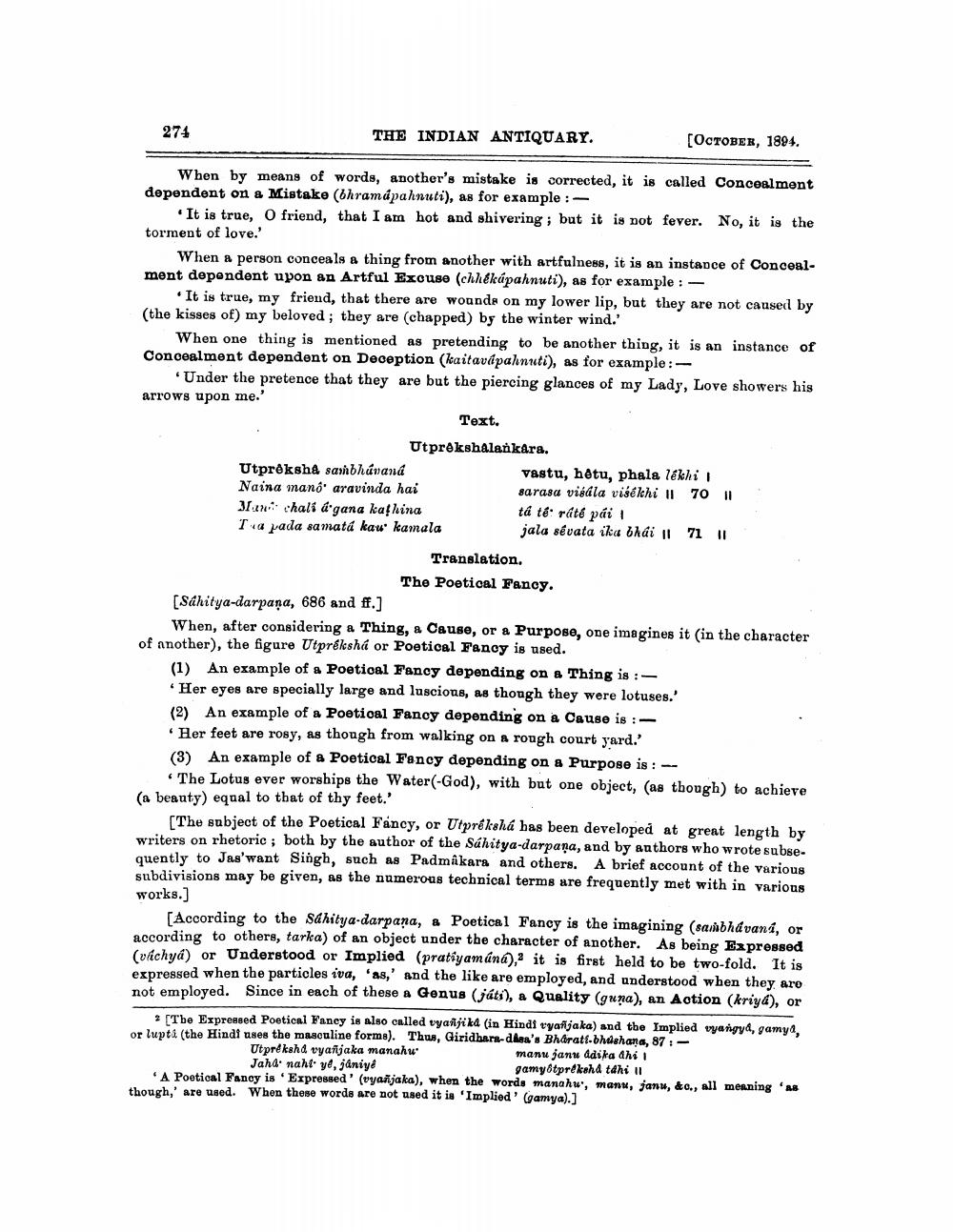________________
274
THE INDIAN ANTIQUARY.
[OCTOBER, 1894.
When by means of words, another's mistake is corrected, it is called Concealment dependent on a Mistake (bhramápahnuti), as for example:
It is true, O friend, that I am hot and shivering; but it is not fever. No, it is the torment of love.'
When a person conceals a thing from another with artfulness, it is an instance of Concealment dependent upon an Artful Excuse (chlékápahnuti), as for example: -
It is true, my friend, that there are wounds on my lower lip, but they are not caused by (the kisses of) my beloved; they are (chapped) by the winter wind.'
When one thing is mentioned as pretending to be another thing, it is an instance of Concealment dependent on Deception (kaitavápalunuti), as for example:
Under the pretence that they are but the piercing glances of my Lady, Love showers his arrows upon me.'
Text.
Utprekshalankara. Utprèksh& sambhávaná
vastu, hêtu, phala lekhil Naina mano' aravinda hai
sarasa viedla viselhi il 70 II 31.20 chali d'gana kathina
tá té: raté pái Tia pada samatá kau kamala
jala sevata ika bhái | 71 !!
Translation.
The Poetical Fancy. [Sahitya-darpaşa, 686 and ff.]
When after considering a Thing, a Cause, or a Purpose, one imagines it in the character of another), the figure Utprękshá or Poetical Fancy is used.
(1) An example of a Poetical Fancy depending on a Thing is :
Her eyes are specially large and luscious, as though they were lotuses.' (2) An example of a Poetioal Fancy depending on a Cause is :Her feet are rosy, as though from walking on a rough court yard.' (3) An example of a Poetical Fancy depending on a Purpose is :--
The Lotus ever worships the Water(-God), with but one object, (as though) to achieve (a beauty) equal to that of thy feet.'
The subject of the Poetical Fancy, or Utpréksha has been developed at great length by writers on rhetoric ; both by the author of the Sáhitya-darpaņa, and by authors who wrote subse. quently to Jas'want Singh, such as Padmakara and others. A brief account of the various subdivisions may be given, as the numerous technical terms are frequently met with in various works.)
[According to the Sahitya-darpana, & Poetical Fancy is the imagining (sanbhavand, or according to others, tarka) of an object under the character of another. As being Expressed (vichyá) or Understood or Implied (pratiyamána), it is first held to be two-fold. It is expressed when the particles iva, 'as,' and the like are employed, and understood when they are not employed. Since in each of these a Genus (játs), a Quality (guna), an Aotion (kriyd), or
Tbe Expressed Poetical Fancy is also called vyafijika (in Hindi vyafljaka) and the Implied vyangya, gamy, or lupta (the Hindi uses the masculine forms). Thus, Giridhara-dhea's Bharati.bhdshana, 87: Utprekshd vyañjaka manahu
manu janu adika dhil Jahd. nahi ye, janiye
gamytpreksha tahi 11 A Poetical Fanoy is 'Expressed' (uyaljaka), when the words manahu, manu, janu, &o., all meaning 'As though,' are used. When these words are not used it is 'Implied' (gamya).]




